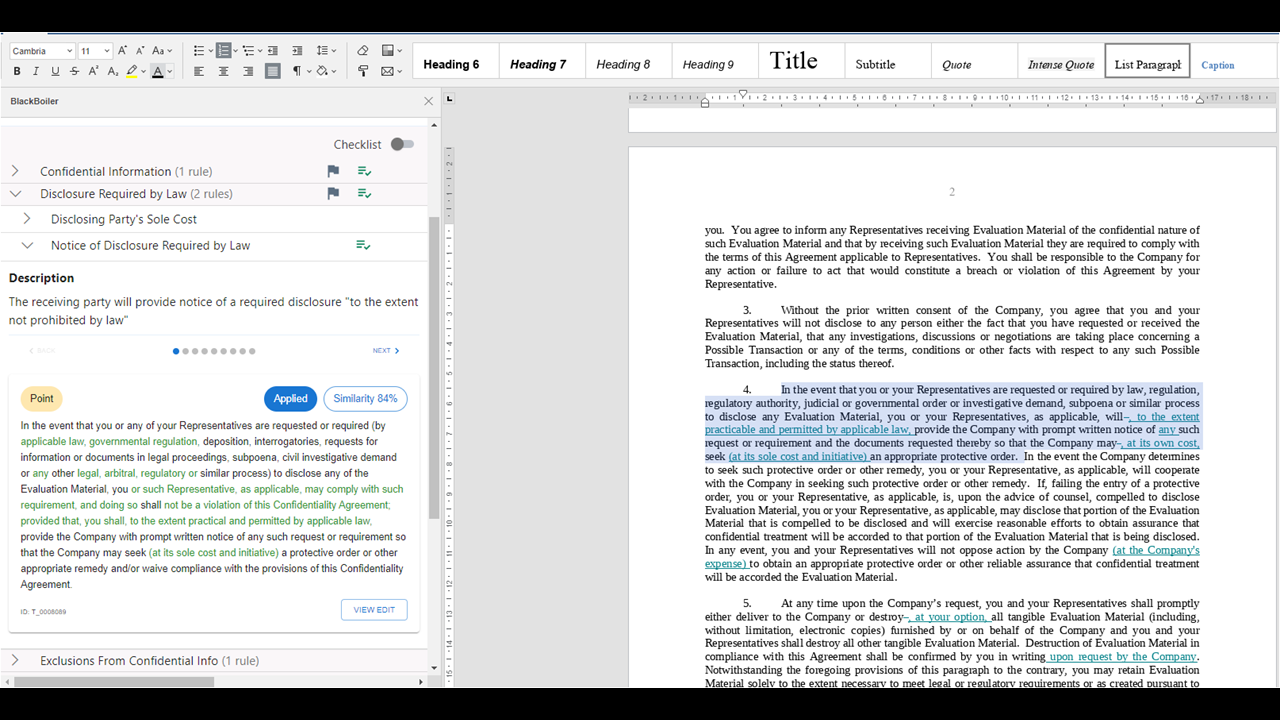BlackBoiler, a company whose AI-driven contract review software automatically reviews and redlines contract drafts using Microsoft Word’s Track Changes, is today releasing a new feature, ContextAI, that enhances the markup by showing the user the reason for every redline.
Last year, I reported on BlackBoiler’s launch of Playbook Builder, a feature that helps companies automate the creation of contract playbooks, eliminating the need for extensive training of BlackBoiler’s AI.
This new ContextAI feature builds on those playbooks to show users not only its suggested redlines, but also why it suggested those redlines in conformance with the playbook.
Now, when BlackBoiler makes a change to a contract draft, it shows the playbook rules that prompted the change and provides examples from the playbook of how others in the user’s organization have edited the same or similar language in the past.
Learn more about BlackBoiler in the LawNext Legal Technology Directory.
In a demonstration yesterday, Daniel Broderick, co-founder and CEO of BlackBoiler, said that, by giving a reason for every edit BlackBoiler makes, they are removing the black box from the AI.
“Users want to know what’s inside the black box,” he said. “This is a major step forward that will allow lawyers and negotiators to understand why the AI has made the changes it has and enable them to have confidence in how this technology is powering their deals.”
The way it works is simple. When reviewing a contract draft in BlackBoiler, a left-hand panel shows the list of playbook rules. A flag icon next to a rule indicates that there is potentially the need for an edit that the user should review. A green icon indicates that BlackBoiler applied the rule and made the edit to the contract.
Click to open any rule, and BlackBoiler takes you to that point in the contract, where you can see the redlines it made within the document. In the left panel, you see a description of the rule plus the actual example of how your organization has edited similar text in the past. This example is the training sentence that BlackBoiler used to make the edit. It also shows the degree of similarity between the prior and current text.
BlackBoiler also allows the user to scroll through other similar revisions from the past that were not used in this edit.
If BlackBoiler fails to find language in the contract that is semantically similar to a rule in your playbook, it will insert your language in its entirety. To do this, it analyzes the document to find the appropriate location to insert the language, based on where that language has been inserted in previous contracts, and it shows you a context rating for its certainty of the location in which it made the insertion.
You could add a rule to the playbook on the fly, while you’re reviewing a document, then re-upload the contract, and the edit for that rule will be added.
Broderick believes that two factors are important to getting lawyers to adopt AI. One is control — that lawyers want to have control over what the AI is doing. Playbook Builder addresses that factor, putting lawyers in control of the rules applied to their contracts.
The other factor, he said, is explainability. That is what ContextAI addresses — explaining to the lawyer why BlackBoiler did what it did.
Broderick also believes that this new feature can help drive onboarding to BlackBoiler by offering explanations for what it does.
He describes the scenario of an attorney who questions an edit made by BlackBoiler, saying, “We’ve never made this edit before.” Now, with ContextAI, the attorney can see that, in fact, someone in that attorney’s organization made that edit just last week.
Another scenario is when a newer lawyer is reviewing a contract. “If you just throw an edited document at them, they don’t know why the edits were made,” Broderick says. “This helps them get up to speed more quickly.”
BlackBoiler says it customer roster includes AmLaw 25 law firms and organizations within the Fortune 1000, including several customers in the construction industry. The company holds 11 patents in the U.S. and is currently pursuing additional IP protection in the U.S., Canada, and Europe.
 Robert Ambrogi Blog
Robert Ambrogi Blog